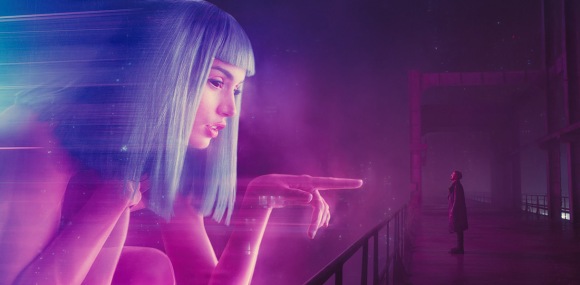Denis Villeneuve’s bold, beautiful, brainy return to ‘Blade Runner’

Blade Runner 2049
Starring Ryan Gosling, Harrison Ford & Jared Leto
Directed by Denis Villeneuve
R
Last Christmas, Ryan Gosling was waltzing with Emma Stone in the stars over La La Land.
Now he’s zipping around in a flying car in the cold, grey, grungy skies above a very different Los Angeles—a dystopian, disorienting future world where humans coexist and interact with nearly human, biologically engineered androids known as replicants.
Welcome to Blade Runner 2049, director Denis Villeneuve’s sprawling, hyper-stylish, long-awaited follow-up to Ridley Scott’s 1982 neo-noir sci-fi classic. The original film famously starred Harrison Ford as Rick Deckard, a former police office working as a “blade runner” to track down and retire—kill—renegade replicants.

Dave Bautista
Now, set 30 years later, Gosling’s character, an LAPD officer known as K, is also a blade runner. The movie opens when he pays a routine visit to an outdated replicant, a farmer (Dave Bautista) who’s passed his expiration date. Before K pulls the plug, the farmer has a cryptic message for him: “You’ve never seen a miracle,” he says.
Those words get into K’s head—already throbbing with troubling visions from something that happened in his past. Or did it?
When K makes a startling discovery—a seeming impossibility—that sets everything in motion, it threatens to bring down the fragile social order between humans and replicants. “This could break the world,” K’s police boss, Lt. Joshi (Robin Wright), tells him. She orders him to erase the evidence and keep the case under wraps. “What you saw didn’t happen.”
But the secret gets out, putting K on a dangerous course to solve the mystery—the one that seems so impossible, as well as the one inside his head.

Sylvia Hoeks
Jared Leto is great-balls-of-fire creepy as Niander Wallace, the rich, blind, tech-guru industrialist with a god complex who plans to super-colonize the cosmos with trillions of replicant-slaves. His icy aide, the ruthless replicant Luv (Sylvia Hoeks), is on the trail of the same thing as K, but for a vastly different reason.
K’s companion Joi—a life-size, lifelike, 3D “application,” like a sexy Siri—longs to know what it’s like to be real, to have flesh, to be able to feel K’s touch and to be felt in return. Whenever she goes into active mode, her programming sounds a few notes from “Peter and the Wolf,” the Prokofiev musical play about animals that come alive. Played by Cuban actress Ana de Armas, it’s one of the film’s most emotive, poignant performances.
Mackenzie Davis (Cameron Rendon on TV’s Halt and Catch Fire) makes the most of her supporting role as a mysterious prostitute named Mariette. If there’s a sequel, she definitely gets my vote for more screen time.
And of course, eventually K’s path leads him to Deckard (Harrison Ford), holed up in casino hotel in Las Vegas, now a radioactive wasteland.
Director Villeneuve—whose other films include Prisoners, Sicario and Arrival—has created a brilliant new sci-fi benchmark, an epic movie yardstick against which future science fiction flicks will be compared and measured. It’s the 2001 of 2017. Veteran cinematographer Roger Deakins, with 13 Oscar nominations, should certainly expect another. His spectacular view of this majestic, grotesquely beautiful futurama is a feast for the eyes.

The score, by Oscar-winning Hans Zimmer and Benjamin Wallfisch, sometimes stretches the limits of what typically might be considered music, with booming, bowel-rattling bass-note rumbles that pile-drive the action and anchor the deep-dive philosophical musings—on memory, belief, faith, love, life, reality, what it means to be alive and what it means to be human.
When Deckard and K meet, Deckard quotes a line from Robert Louis Stevenson’s Treasure Island—appropriately enough, since something that’s been unearthed, a buried treasure, brought the two of them together. Before they bond, they brawl, in a casino showroom where a flickering hologram of Elvis Presley performs onstage, a high-tech ghost of future past, flanked by holographic showgirls.
Later, a neon billboard promises, in gigantic, glowing letters, Anything You Want. In this future world, anything can indeed be purchased—companionship, pleasure, a thrill, a high, a lover, memories, a past.
For sci-fi fans, for movie lovers who want to see something truly spectacular, for cinephiles who’ve been waiting for the next big thing: Here it is. The bold, beautiful, brainy Blade Runner 2049 is anything you want, and quite likely much more.
In theaters Oct. 6, 2017